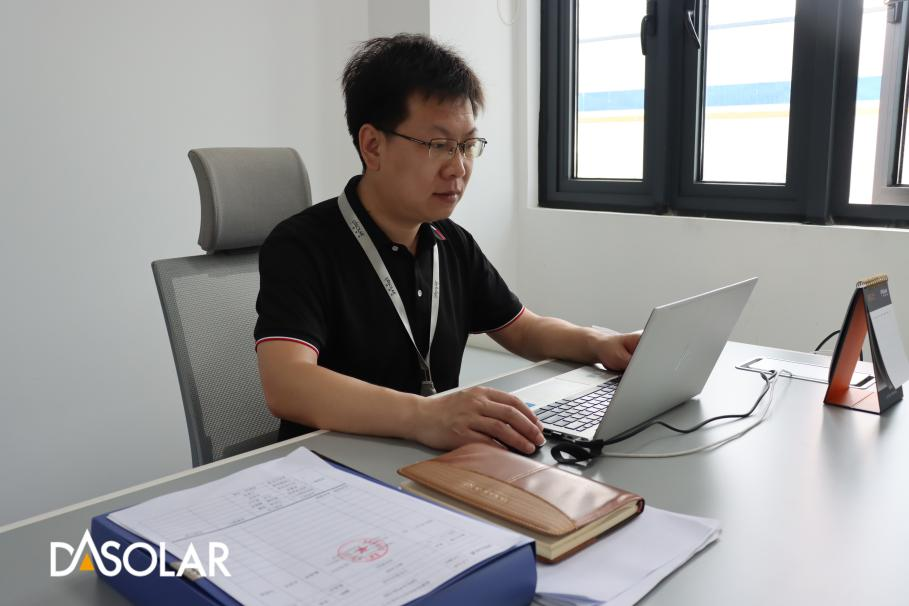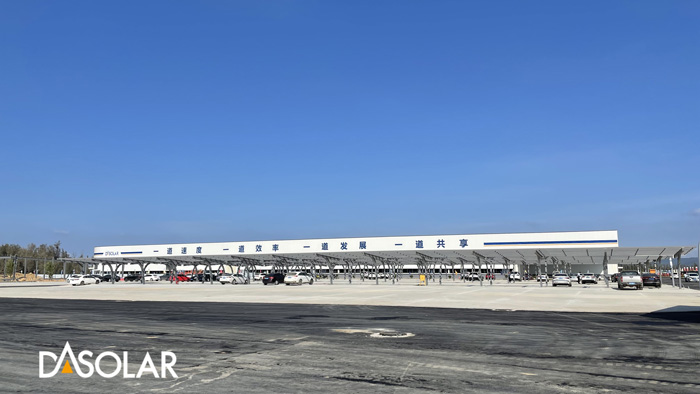DAS Solar kicks off smart and green sustainability journey with Zhangzhou "zero carbon" Base
2024-05-08
With its innovative practices and firm determination, the DAS Solar Zhangzhou Base contributes to the Earth's dual carbon goals.
"The export of PV modules faces a number of challenges, given the current international situation and market environment," Shi Yajun, Head of Engineering Power Department at DAS Solar Zhangzhou Base, said. "The DAS Solar Zhangzhou Base has a strong sense of confidence and determination in safety, production, and environmental innovation."

In addition to his expertise in the field of photovoltaics, Shi Yajun is a dedicated advocate for green transformation. As part of its proactive response to the EU carbon tariff implementation and to enhance DAS Solar's product competitiveness in overseas markets, DAS Solar plans to establish its own zero-carbon factory soon. In accordance with its zero carbon goals, the DAS Solar Zhangzhou Base follows sustainable development principles, promotes zero-carbon transformations, and uses green energy for its sustainable development.
The DAS Solar Zhangzhou Base continually optimizes production processes, enhances energy efficiency, and guiding and providing the foundation for energy-saving and carbon reduction planning. Further, DAS Solar has long been promoting green supply chain management, encouraging suppliers and partners to adopt environmental measures, collectively driving the green development of the entire industry.
To minimize energy waste for high-power pumps and motors, Zhangzhou Base has undertaken mechanical modifications to power equipment, evaluating and matching production. The Phase I of Zhangzhou Base's parking shed roof has been equipped with 7.3 MW of rooftop PV modules, providing electrical power for the base's operations.
"Through these initiatives, DAS Solar Zhangzhou Base has not only significantly reduced carbon emissions but also established a replicable and scalable model for the industry," he said.
Currently, DAS Solar Zhangzhou Base is certified under ISO 14067. The base will implement the ISO 50001 Energy Management System, which will facilitate the establishment of a more scientific and logical energy management system for future manufacturing processes, maximizing energy utilization.

"Cost pressures, supply chain and partner relationships, and employee training and awareness are among the challenges for these technological and facility upgrades," Mr. Shi said.
The journey to zero-carbon transformation is not without obstacles, and the DAS Solar Zhangzhou Base faces many challenges in its advancement. However, Mr. Shi believes that the challenges have strengthened the team's innovative spirit and problem-solving skills. As for technological and facility upgrades, he indicates that updating and retrofitting existing technologies and facilities is essential to moving traditional production factories towards zero-carbon manufacturing facilities. By introducing new clean production technologies, replacing or upgrading existing energy equipment, and improving production processes, significant investments are needed, and new technologies must be credible and stable. He states that the introduction of new technologies, facility renovations, and energy transformation may incur additional expenses when transitioning to a zero-carbon factory from a cost pressures perspective. In order to ensure competitiveness in the zero-carbon factory transformation process, businesses need to balance their investment and returns, reducing costs and improving efficiency.
"Transforming a factory into a zero-carbon one involves more than just technological and facility upgrades, employees need to be actively involved and cooperative. To understand the operation and application of new technologies, as well as zero-carbon factory operational principles, employees need to undergo relevant training," Mr. Shi said. "Companies need to actively enhance employees' environmental awareness and incentive their involvement in the zero-carbon factory transformation process."
DAS Solar reduced approximately 13.97 million tons of standard coal annually, reducing around 41.89 million tons of CO2 emissions in 2023. Over the past few years, DAS Solar has continuously expanded its decentralized manufacturing layout. This model leverages both geographical advantages and local manufacturing, reducing material logistics costs as well as module transportation costs, while allowing the company to explore different markets with its geographical advantage. By manufacturing locally, DAS Solar can offer more timely services to its customers in different regions, infusing sustainable energy into local energy transformation efforts and green sustainable development.






 浙公网安备33080302000236
浙公网安备33080302000236